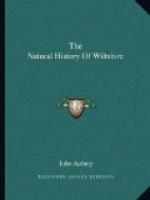PART II. — CHAPTER VIII.
Thedownes.
We now make our ascent to the second elevation or the hill countrey, known by the name of the Downes, or Salisbury Plaines; and they are the most spacious plaines in Europe, and the greatest remaines that I can heare of of the smooth primitive world when it lay all under water.
These downes runne into Hampshire, Berkshire, and Dorsetshire; but as to its extent in this county, it is from Red-hone, the hill above Urshfont, to Salisbury, north and south, and from Mere to Lurgershall, east and west. The turfe is of a short sweet grasse, good for the sheep, and delightfull to the eye, for its smoothnesse like a bowling green, and pleasant to the traveller; who wants here only variety of objects to make his journey lesse tedious: for here is “nil nisi campus et aer”, not a tree, or rarely a bush to shelter one from a shower.
The soile of the downes I take generally to be a white earth or mawme. More south, sc. about Wilton and Chalke, the downes are intermixt with boscages that nothing can be more pleasant, and in the summer time doe excell Arcadia in verdant and rich turfe and moderate aire, but in winter indeed our air is cold and rawe. The innocent lives here of the shepherds doe give us a resemblance of the golden age. Jacob and Esau were shepherds; and Amos, one of the royall family, asserts the same of himself, for he was among the shepherds of Tecua [Tekoa] following that employment. The like, by God’s own appointment, prepared Moses for a scepter, as Philo intimates in his life, when he tells us that a shepherd’s art is a suitable preparation to a kingdome. The same he mentions in his Life of Joseph, affirming that the care a shepherd has over his cattle very much resembles that which a King hath over his subjects. The same St. Basil, in his Homily de St. Mamme Martyre has, concerning David, who was taken from following the ewes great with young ones to feed Israel. The Romans, the worthiest and greatest nation in the world, sprang from shepherds. The augury of the twelve vultures plac’t a scepter in Romulus’s hand, which held a crook before; and as Ovid sayes:-




